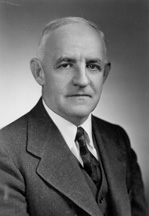Frank Porter Graham
| Frank Porter Graham | |
|---|---|
 |
|
|
United States Senator from North Carolina |
|
|
In office March 29, 1949 – November 26, 1950 |
|
| Appointed by | W. Kerr Scott |
| Preceded by | Joseph Melville Broughton |
| Succeeded by | Willis Smith |
| President of the University of North Carolina | |
|
In office 1930–1949 |
|
| Preceded by | Harry Woodburn Chase |
| Succeeded by | Gordon Gray |
| Personal details | |
| Born |
October 14, 1886 Fayetteville, North Carolina |
| Died | February 16, 1972 (aged 85) Chapel Hill, North Carolina |
| Nationality | American |
| Political party | Democratic |
| Spouse(s) | Marian Drane Graham |
| Relations | Archibald Wright "Moonlight" Graham |
| Alma mater |
University of North Carolina at Chapel Hill Columbia University |
| Profession | Politician, Educator |
| Religion | Presbyterian |
Frank Porter Graham (October 14, 1886 – February 16, 1972) was President of the University of North Carolina at Chapel Hill and, for a brief period, a United States Senator.
Born in Fayetteville, North Carolina in 1886, one of ten children born to Alexander (September 12, 1844 – November 2, 1934) and Katherine B. Sloan (March 8, 1855 – January 1, 1939). His older brother, Archibald Wright "Moonlight" Graham (December 28, 1879 – August 25, 1965), was a baseball player who appeared for the New York Giants and inspiration for the 1989 film Field of Dreams starring Kevin Costner, James Earl Jones, Ray Liotta, Amy Madigan, and featuring Burt Lancaster and Frank Whaley as older and younger versions of "Moonlight". While playing baseball (mostly in the minor leagues), Archie Graham also became a doctor, completing his medical degree at the University of Maryland, Baltimore in 1905.
Graham graduated from the University of North Carolina at Chapel Hill, where he was a member of The Dialectic and Philanthropic Societies, in 1909. He thereafter studied law and received his license in 1913. He received a graduate degree in 1916 from Columbia University. While he was studying law, Graham was a high school teacher in Raleigh, North Carolina. He later embarked on a career as a history professor at the University of North Carolina at Chapel Hill from 1915 until 1930. He interrupted his teaching profession to enlist in 1917 in the United States Marine Corps for service in World War I. He was discharged as a first lieutenant in 1919.
...
Wikipedia
